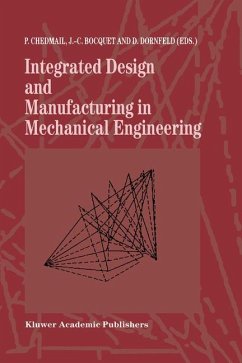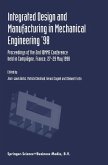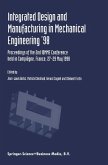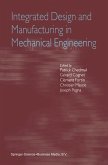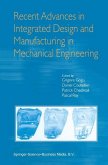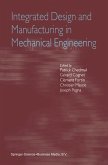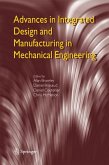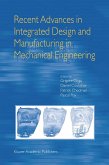Integrated Design and Manufacturing in Mechanical Engineering
Proceedings of the 1st IDMME Conference held in Nantes, France, 15¿17 April 1996
Herausgegeben:Chedmail, Patrick; Bocquet, J.-C.; Davidson, David
Integrated Design and Manufacturing in Mechanical Engineering
Proceedings of the 1st IDMME Conference held in Nantes, France, 15¿17 April 1996
Herausgegeben:Chedmail, Patrick; Bocquet, J.-C.; Davidson, David
- Broschiertes Buch
- Merkliste
- Auf die Merkliste
- Bewerten Bewerten
- Teilen
- Produkt teilen
- Produkterinnerung
- Produkterinnerung
This volume contains the selected papers of the first I.D.M.M.E. conference on 'Integrated Design and Manufacturing in Mechanical Engineering', held in Nantes from 15-17 April 1996. Its objective was to discuss the questions related to the definition of the optimal design and manufacturing processes and to their integration through coherent methodologies in adapted environments. The initiative of the Conference and the organization thereof, is mainly due to the efforts of the french PRIMECA group (Pool of Computer Resources for Mechanics) started eight years ago. We were able to attract the…mehr
Andere Kunden interessierten sich auch für
![Integrated Design and Manufacturing in Mechanical Engineering ¿98 Integrated Design and Manufacturing in Mechanical Engineering ¿98]() Integrated Design and Manufacturing in Mechanical Engineering ¿98150,99 €
Integrated Design and Manufacturing in Mechanical Engineering ¿98150,99 €![Integrated Design and Manufacturing in Mechanical Engineering ¿98 Integrated Design and Manufacturing in Mechanical Engineering ¿98]() BatozIntegrated Design and Manufacturing in Mechanical Engineering ¿98163,99 €
BatozIntegrated Design and Manufacturing in Mechanical Engineering ¿98163,99 €![Integrated Design and Manufacturing in Mechanical Engineering Integrated Design and Manufacturing in Mechanical Engineering]() ChedmailIntegrated Design and Manufacturing in Mechanical Engineering82,99 €
ChedmailIntegrated Design and Manufacturing in Mechanical Engineering82,99 €![Recent Advances in Integrated Design and Manufacturing in Mechanical Engineering Recent Advances in Integrated Design and Manufacturing in Mechanical Engineering]() Recent Advances in Integrated Design and Manufacturing in Mechanical Engineering161,99 €
Recent Advances in Integrated Design and Manufacturing in Mechanical Engineering161,99 €![Integrated Design and Manufacturing in Mechanical Engineering Integrated Design and Manufacturing in Mechanical Engineering]() Integrated Design and Manufacturing in Mechanical Engineering81,99 €
Integrated Design and Manufacturing in Mechanical Engineering81,99 €![Advances in Integrated Design and Manufacturing in Mechanical Engineering Advances in Integrated Design and Manufacturing in Mechanical Engineering]() Advances in Integrated Design and Manufacturing in Mechanical Engineering149,99 €
Advances in Integrated Design and Manufacturing in Mechanical Engineering149,99 €![Recent Advances in Integrated Design and Manufacturing in Mechanical Engineering Recent Advances in Integrated Design and Manufacturing in Mechanical Engineering]() Grigore Gogu / Daniel Coutellier / Patrick Chedmail / Pascal Ray (Hgg.)Recent Advances in Integrated Design and Manufacturing in Mechanical Engineering239,99 €
Grigore Gogu / Daniel Coutellier / Patrick Chedmail / Pascal Ray (Hgg.)Recent Advances in Integrated Design and Manufacturing in Mechanical Engineering239,99 €-
-
-
This volume contains the selected papers of the first I.D.M.M.E. conference on 'Integrated Design and Manufacturing in Mechanical Engineering', held in Nantes from 15-17 April 1996. Its objective was to discuss the questions related to the definition of the optimal design and manufacturing processes and to their integration through coherent methodologies in adapted environments. The initiative of the Conference and the organization thereof, is mainly due to the efforts of the french PRIMECA group (Pool of Computer Resources for Mechanics) started eight years ago. We were able to attract the internationru community with the support of the International Institution for Production Engineering Research (C.I.R.P.). The conference brought together two hundred and fifty specialists from around the world. About ninety papers and twenty posters were presented covering three main topics : optimization and evaluation of the product design process, optimization and evaluation of the manufacturing systems and methodological aspects.
Produktdetails
- Produktdetails
- Verlag: Springer / Springer Netherlands
- Artikelnr. des Verlages: 978-94-010-6356-2
- Softcover reprint of the original 1st ed. 1997
- Seitenzahl: 572
- Erscheinungstermin: 5. November 2012
- Englisch
- Abmessung: 240mm x 160mm x 31mm
- Gewicht: 902g
- ISBN-13: 9789401063562
- ISBN-10: 9401063567
- Artikelnr.: 37479997
- Herstellerkennzeichnung Die Herstellerinformationen sind derzeit nicht verfügbar.
- Verlag: Springer / Springer Netherlands
- Artikelnr. des Verlages: 978-94-010-6356-2
- Softcover reprint of the original 1st ed. 1997
- Seitenzahl: 572
- Erscheinungstermin: 5. November 2012
- Englisch
- Abmessung: 240mm x 160mm x 31mm
- Gewicht: 902g
- ISBN-13: 9789401063562
- ISBN-10: 9401063567
- Artikelnr.: 37479997
- Herstellerkennzeichnung Die Herstellerinformationen sind derzeit nicht verfügbar.
1: The Design Process.- Analysis of the setting up of a concurrent engineering scenario.- Failure-sensitive Product Development.- A language for the modeling of the design process in mechanical engineering.- CAD/analysis integration. (An object-oriented approach).- Rethinking CAD tools through their use.- Product / Manufacturing: A systemic approach for simultaneous engineering.- On a genetic multiobjective approach for the integration and optimization of assembly product design and process planning.- Manufacturing Flexibility: A New Evaluation.- 2: Feature Based Modelling.- Integrated CAD and CAPP around feature recognition techniques.- Feature-State approach for operation sequence generation.- Machining features: integration of the machining function in the modelling of parts for automated process planning.- Expression and recognition of design intentions. The contributions of multimodality.- Integration of the machining point of view in the product modelling: the fixturing features.- From design to manufacturing of forged parts: automatic process planning for dies and parts.- 3: Automatic Modelling with Finite Element.- Tools for optimal or near-optimal sensors locations.- Fully integrated finite element models in the design and manufacture of glass products.- Maestro: a module dedicated to the integration of structural analysis within the design process.- Thickness optimization of beams and shells with large displacements.- Quality control of finite element analyses in shape optimization.- Methods and softwares for the automation of finite element analyses in 3D.- 4: Automatic Modelling of Mechanisms.- UsyCaMs: A software package for the interactive synthesis of cam mechanisms.- Workspace-oriented methodology for designing a parallel manipulator.- Design of roboticwork cells: synthesis and application.- A tool for robot design: feasible trajectory from a singularity.- Sensitivity analysis for optimisation of flexible multi-body systems.- Dynamic modelling of mechanisms. Qualifying of three integration schemes.- 5: Modelling of Processes.- Thermal analysis of orthogonal cutting. Simulation and Experiments.- A systematic approach to the surface modelling of forged parts.- Simplified stamping simulation: an aid for component design.- Mechanical simulation of machining.- Thermal modal analysis and modelling of machine-tools.- Fixture design process modelling.- 6: Modelling for Control and Measuring.- Integrating design and manufacturing by tolerance chart analysis.- The TTRE: Micro tolerancing Model for CAD-CAM Modelers.- Models for tolerancing process by considering mechanism flexibility.- Probe definition for inspection of mechanical parts by CMM.- Integrated design and manufacturing for precision mechanical components.- 7: Cam and Off-Line Programming.- Choice of machine tool configuration. Determination of real visibility.- Flank milling of ruled surface with additionally-five-axis CNC machine.- Synthesis of reconfigurable-Fixture support configurations for thin-walled objects.- Computer aided process planning in turning: ascendant design by features.- 8: Integrated Design and Cad-Cam Systems.- Proposals for a product model.- Towards declarative geometric modelling in mechanics.- Modeling product information in concurrent engineering environments.- Integration of design and manufacturing data models using step.- Template architecture and services for integrating CAD-CAM and machining in small companies.- Manufacturing capability modelling for concurrent product development.- Performance improvement of a surface-surface intersection method.- 9: Applications of Integrated Design and Manufacturing.- Integrated design of electromagnetic motors.- Optimisation of a structure for biaxial mechanical tests.- Hull design methodology for cross-country vehicles.- A methodology for the design of servo-systems dedicated to machine-tools.- Methodology for interactive design of a product and its assembly line.- Modelling and analysis of the stamping and clamping of a cylinder head gasket.- Author Index.
1: The Design Process.- Analysis of the setting up of a concurrent engineering scenario.- Failure-sensitive Product Development.- A language for the modeling of the design process in mechanical engineering.- CAD/analysis integration. (An object-oriented approach).- Rethinking CAD tools through their use.- Product / Manufacturing: A systemic approach for simultaneous engineering.- On a genetic multiobjective approach for the integration and optimization of assembly product design and process planning.- Manufacturing Flexibility: A New Evaluation.- 2: Feature Based Modelling.- Integrated CAD and CAPP around feature recognition techniques.- Feature-State approach for operation sequence generation.- Machining features: integration of the machining function in the modelling of parts for automated process planning.- Expression and recognition of design intentions. The contributions of multimodality.- Integration of the machining point of view in the product modelling: the fixturing features.- From design to manufacturing of forged parts: automatic process planning for dies and parts.- 3: Automatic Modelling with Finite Element.- Tools for optimal or near-optimal sensors locations.- Fully integrated finite element models in the design and manufacture of glass products.- Maestro: a module dedicated to the integration of structural analysis within the design process.- Thickness optimization of beams and shells with large displacements.- Quality control of finite element analyses in shape optimization.- Methods and softwares for the automation of finite element analyses in 3D.- 4: Automatic Modelling of Mechanisms.- UsyCaMs: A software package for the interactive synthesis of cam mechanisms.- Workspace-oriented methodology for designing a parallel manipulator.- Design of roboticwork cells: synthesis and application.- A tool for robot design: feasible trajectory from a singularity.- Sensitivity analysis for optimisation of flexible multi-body systems.- Dynamic modelling of mechanisms. Qualifying of three integration schemes.- 5: Modelling of Processes.- Thermal analysis of orthogonal cutting. Simulation and Experiments.- A systematic approach to the surface modelling of forged parts.- Simplified stamping simulation: an aid for component design.- Mechanical simulation of machining.- Thermal modal analysis and modelling of machine-tools.- Fixture design process modelling.- 6: Modelling for Control and Measuring.- Integrating design and manufacturing by tolerance chart analysis.- The TTRE: Micro tolerancing Model for CAD-CAM Modelers.- Models for tolerancing process by considering mechanism flexibility.- Probe definition for inspection of mechanical parts by CMM.- Integrated design and manufacturing for precision mechanical components.- 7: Cam and Off-Line Programming.- Choice of machine tool configuration. Determination of real visibility.- Flank milling of ruled surface with additionally-five-axis CNC machine.- Synthesis of reconfigurable-Fixture support configurations for thin-walled objects.- Computer aided process planning in turning: ascendant design by features.- 8: Integrated Design and Cad-Cam Systems.- Proposals for a product model.- Towards declarative geometric modelling in mechanics.- Modeling product information in concurrent engineering environments.- Integration of design and manufacturing data models using step.- Template architecture and services for integrating CAD-CAM and machining in small companies.- Manufacturing capability modelling for concurrent product development.- Performance improvement of a surface-surface intersection method.- 9: Applications of Integrated Design and Manufacturing.- Integrated design of electromagnetic motors.- Optimisation of a structure for biaxial mechanical tests.- Hull design methodology for cross-country vehicles.- A methodology for the design of servo-systems dedicated to machine-tools.- Methodology for interactive design of a product and its assembly line.- Modelling and analysis of the stamping and clamping of a cylinder head gasket.- Author Index.

